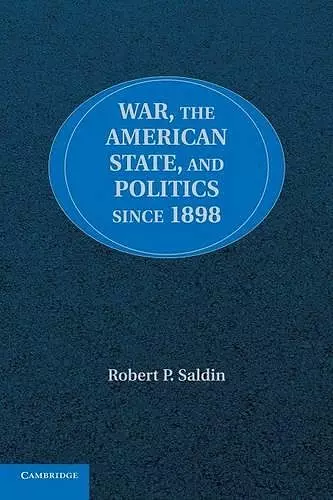War, the American State, and Politics since 1898
Format:Paperback
Publisher:Cambridge University Press
Published:30th Jan '14
Currently unavailable, and unfortunately no date known when it will be back

Examines how international wars have affected domestic politics and policymaking in the United States.
This book examines major foreign conflicts from the Spanish-American War through Vietnam, arguing that international conflicts have strong effects on American political parties, elections, state development, and policymaking. First, major wars expose and highlight problems requiring governmental solutions or necessitating emergency action. Second, despite well-known curtailments of civil liberties, wars often enhance democracy by drawing attention to the contributions of previously marginalized groups and facilitating the extension of fuller citizenship rights to them. Finally, wars affect the party system. Foreign conflicts create crises - many of which are unanticipated - that require immediate attention, supplant prior issues on the policy agenda, and engender shifts in party ideology. These new issues and redefinitions of party ideology frequently influence elections by shaping both elite and mass behavior.
“Saldin’s work is a smart and fresh look at a key topic. It is rich with interesting information. It places wars at the center of American political development. From Manila Bay through Vietnam, the wars have fed into politics and policymaking in lasting ways. The implications for understanding our current era are clear and important.” —David Mayhew, Yale University
“War, the American State, and Politics since 1898 is an essential corrective to the notion that all politics is domestic. Paying close attention to the institutional state, to democratic rights, and to partisan politicking, Rob Saldin instead finds the tendrils of foreign combat absolutely everywhere.” —Byron Shafer, University of Wisconsin, Madison
“It has long since become an accepted truism that “war made the state,” as Charles Tilly famously remarked. Scholars of comparative politics are not surprised by this assertion, and have devoted much attention to understanding this important relationship. Yet the study of American politics is just beginning to grapple with its implications, both for state building and political development more broadly. A good place to start is this ambitious, well-written book by Robert Saldin, a successful effort that helps us better understand the impact that wars had on the American political system in the twentieth century….Saldin has written an important book that should be read widely. He upends conventional wisdom in a number of ways, and scholars of parties, elections, and American political development will all have to contend with his argument.” -William D. Adler, Johns Hopkins University, Perspectives on Politics
“Saldin sheds new light on transformations in American state building during war….Students of international and domestic politics will find this book valuable in showing how international variables affect domestic outcomes.” -Sean Kay, Ohio Wesleyan University, Political Science Quarterly
“War and democracy have been linked since the Peloponnesian War, and the modern state’s ability to make war has been inextricably linked to its ability to incorporate large numbers of citizens as taxpayers and especially as soldiers. Robert Saldin’s new book offers an important account of these dynamics in the context of American political development, and it is an account that surely warrants serious attention from students of American democracy. And of democratization more generally.”- Jeffrey C. Isaac, James H. Rudy Professor of Political Science, Indiana University
ISBN: 9781107690981
Dimensions: 235mm x 155mm x 18mm
Weight: 460g
272 pages